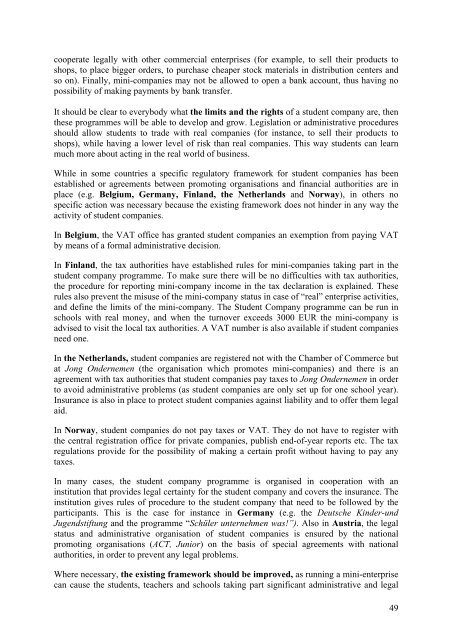Final Report of the Expert Group - European Commission - Europa
Final Report of the Expert Group - European Commission - Europa
Final Report of the Expert Group - European Commission - Europa
Create successful ePaper yourself
Turn your PDF publications into a flip-book with our unique Google optimized e-Paper software.
cooperate legally with o<strong>the</strong>r commercial enterprises (for example, to sell <strong>the</strong>ir products toshops, to place bigger orders, to purchase cheaper stock materials in distribution centers andso on). <strong>Final</strong>ly, mini-companies may not be allowed to open a bank account, thus having nopossibility <strong>of</strong> making payments by bank transfer.It should be clear to everybody what <strong>the</strong> limits and <strong>the</strong> rights <strong>of</strong> a student company are, <strong>the</strong>n<strong>the</strong>se programmes will be able to develop and grow. Legislation or administrative proceduresshould allow students to trade with real companies (for instance, to sell <strong>the</strong>ir products toshops), while having a lower level <strong>of</strong> risk than real companies. This way students can learnmuch more about acting in <strong>the</strong> real world <strong>of</strong> business.While in some countries a specific regulatory framework for student companies has beenestablished or agreements between promoting organisations and financial authorities are inplace (e.g. Belgium, Germany, Finland, <strong>the</strong> Ne<strong>the</strong>rlands and Norway), in o<strong>the</strong>rs nospecific action was necessary because <strong>the</strong> existing framework does not hinder in any way <strong>the</strong>activity <strong>of</strong> student companies.In Belgium, <strong>the</strong> VAT <strong>of</strong>fice has granted student companies an exemption from paying VATby means <strong>of</strong> a formal administrative decision.In Finland, <strong>the</strong> tax authorities have established rules for mini-companies taking part in <strong>the</strong>student company programme. To make sure <strong>the</strong>re will be no difficulties with tax authorities,<strong>the</strong> procedure for reporting mini-company income in <strong>the</strong> tax declaration is explained. Theserules also prevent <strong>the</strong> misuse <strong>of</strong> <strong>the</strong> mini-company status in case <strong>of</strong> “real” enterprise activities,and define <strong>the</strong> limits <strong>of</strong> <strong>the</strong> mini-company. The Student Company programme can be run inschools with real money, and when <strong>the</strong> turnover exceeds 3000 EUR <strong>the</strong> mini-company isadvised to visit <strong>the</strong> local tax authorities. A VAT number is also available if student companiesneed one.In <strong>the</strong> Ne<strong>the</strong>rlands, student companies are registered not with <strong>the</strong> Chamber <strong>of</strong> Commerce butat Jong Ondernemen (<strong>the</strong> organisation which promotes mini-companies) and <strong>the</strong>re is anagreement with tax authorities that student companies pay taxes to Jong Ondernemen in orderto avoid administrative problems (as student companies are only set up for one school year).Insurance is also in place to protect student companies against liability and to <strong>of</strong>fer <strong>the</strong>m legalaid.In Norway, student companies do not pay taxes or VAT. They do not have to register with<strong>the</strong> central registration <strong>of</strong>fice for private companies, publish end-<strong>of</strong>-year reports etc. The taxregulations provide for <strong>the</strong> possibility <strong>of</strong> making a certain pr<strong>of</strong>it without having to pay anytaxes.In many cases, <strong>the</strong> student company programme is organised in cooperation with aninstitution that provides legal certainty for <strong>the</strong> student company and covers <strong>the</strong> insurance. Theinstitution gives rules <strong>of</strong> procedure to <strong>the</strong> student company that need to be followed by <strong>the</strong>participants. This is <strong>the</strong> case for instance in Germany (e.g. <strong>the</strong> Deutsche Kinder-undJugendstiftung and <strong>the</strong> programme “Schüler unternehmen was!”). Also in Austria, <strong>the</strong> legalstatus and administrative organisation <strong>of</strong> student companies is ensured by <strong>the</strong> nationalpromoting organisations (ACT, Junior) on <strong>the</strong> basis <strong>of</strong> special agreements with nationalauthorities, in order to prevent any legal problems.Where necessary, <strong>the</strong> existing framework should be improved, as running a mini-enterprisecan cause <strong>the</strong> students, teachers and schools taking part significant administrative and legal49




